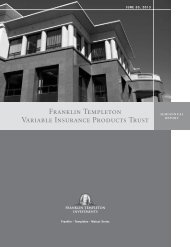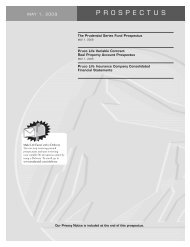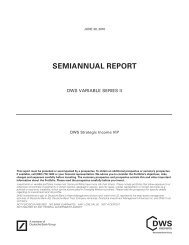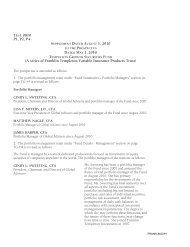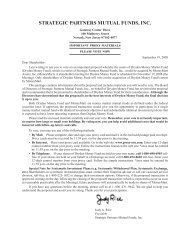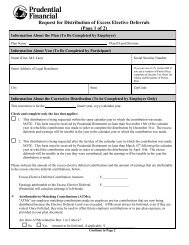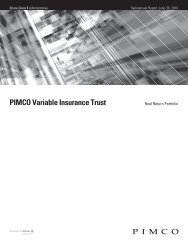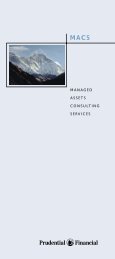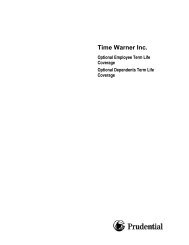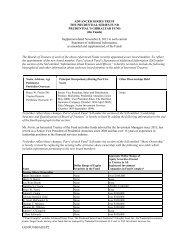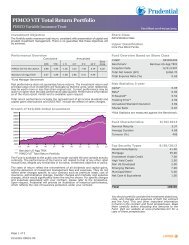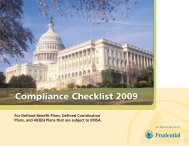Advanced Series Trust AST Academic Strategies Asset ... - Prudential
Advanced Series Trust AST Academic Strategies Asset ... - Prudential
Advanced Series Trust AST Academic Strategies Asset ... - Prudential
Create successful ePaper yourself
Turn your PDF publications into a flip-book with our unique Google optimized e-Paper software.
ased on real yields, are converted to nominal durations through a conversion factor, typically between 20% and 90% of the<br />
respective real duration. All security holdings will be measured in effective (nominal) duration terms. Similarly, the effective duration<br />
of the Barclays Capital U.S. TIPS Index will be calculated using the same conversion factors. The effective duration of the assets<br />
attributable to this investment category will normally vary within three years (plus or minus) of the duration of the Barclays Capital<br />
U.S. TIPS Index.<br />
PIMCO will invest the assets attributable to this investment category primarily in investment grade securities, but may invest up to<br />
10% of the total assets attributable to this investment category in high yield securities (“junk bonds”) rated B or higher by Moody’s, or<br />
equivalently rated by S&P or Fitch, or, if unrated, determined by PIMCO to be of comparable quality. PIMCO also may invest up to<br />
80% of the total assets attributable to this investment category in securities denominated in foreign currencies, and may invest<br />
beyond this limit in U.S. dollar denominated securities of foreign issuers. PIMCO may invest up to 10% of the total assets attributable<br />
to this investment category in securities and instruments that are economically tied to emerging market countries. PIMCO will<br />
normally limit the foreign currency exposure (from non- U.S. dollar-denominated securities or currencies) for this investment<br />
category to 20% of its total assets. PIMCO may concentrate the assets attributable to this investment category in a relatively small<br />
number of issuers.<br />
PIMCO may all of the assets attributable to this investment category in derivative instruments, such as options, futures contracts or<br />
swap agreements, or in mortgage- or asset-backed securities. PIMCO may, without limitation, seek to obtain market exposure to the<br />
securities in which it primarily invests by entering into a series of purchase and sale contracts or by using other investment techniques<br />
(such as buy backs or dollar rolls). Also, PIMCO may invest up to 10% of the total assets attributable to this investment category in<br />
preferred stocks.<br />
Global Infrastructure (Jennison). The Jennison Global Infrastructure strategy is a multi-cap, core strategy with an absolute return focus.<br />
This strategy focuses on investments in infrastructure companies and infrastructure-related companies located throughout the world.<br />
Infrastructure companies are involved in providing the foundation of basic services, facilities and institutions upon which the growth<br />
and development of a community depends. Infrastructure-related companies include wireless telecom firms that may or may not own<br />
the tower and companies involved in transport (shipping and trucking), construction, equipment manufacturing, and materials and<br />
aggregates. <strong>Asset</strong>s held by infrastructure companies and infrastructure-related companies may include toll roads, airports, rail track,<br />
shipping ports, telecom infrastructure, hospitals, schools and utilities such as electricity, gas distribution networks and water. While<br />
Jennison believes its proprietary, fundamental research is critical for successful stock selection, Jennison also focuses on<br />
macroeconomic trends that may affect the companies in which it invests.<br />
Long/Short Market Neutral (QMA). QMA’s Long/Short Market Neutral strategy will use an objective, quantitative approach designed<br />
to exploit persistent mispricings among stocks and other related securities. The objective of this investment strategy is to provide<br />
consistent performance that is uncorrelated with the performance of the stock market. The portfolio holdings for this investment<br />
strategy will consist primarily of a broad universe of stocks. In general, this investment strategy will have long positions in companies<br />
that QMA deems relatively attractive and short positions in companies that QMA deems relatively unattractive, while also managing<br />
the overall risk of the assets attributable to this investment strategy.<br />
Global Tactical <strong>Asset</strong> Allocation (Mellon Capital). This investment strategy will seek total return. To pursue this goal, Mellon Capital<br />
will normally utilize long and short positions in futures, options, or forward contracts to achieve timely and cost-effective investment<br />
exposure to global equity, bond, and currency markets, and in fixed-income securities. Mellon Capital will focus its investments<br />
among the major developed capital markets of the world, such as the U.S., Canada, Japan, Australia, and Western Europe. Mellon<br />
Capital will ordinarily invest in at least three countries. Although this strategy will focus on the world’s major developed capital<br />
markets, Mellon Capital may invest up to 20% of the assets attributable to this investment strategy in emerging market countries.<br />
Mellon Capital also will invest in fixed-income securities, such as bonds, notes and money market instruments, to provide exposure<br />
to bond markets and for liquidity and income.<br />
Mellon Capital’s portfolio management team will seek to deliver alpha by applying a systematic, quantitative investment approach<br />
designed to identify and exploit relative misvaluations across and within global capital markets. Alpha is a measure of the riskadjusted<br />
performance of an investment that factors in the individual risk of the security and not overall market risk. Alpha is often<br />
described as “stock specific return.” Active investment decisions to take long or short positions in individual country, equity, bond,<br />
and currency markets are driven by this quantitative investment process and seek to capitalize on alpha generating opportunities<br />
within and among the major developed capital markets of the world. Mellon Capital’s portfolio management team will analyze the<br />
valuation signals and estimate the expected returns from distinct sources of alpha—country equity markets, country bond markets,<br />
stock versus bond markets, and currency allocation—to construct a portfolio of long and short positions allocated across individual<br />
country, equity, bond, and currency markets. Because there is generally no limitation as to the amount of assets that are required to<br />
be invested in any one asset class, the holdings for this investment strategy generally will not have the same characteristics as the<br />
benchmark index that Mellon Capital will generally use to evaluate investment performance.<br />
204



